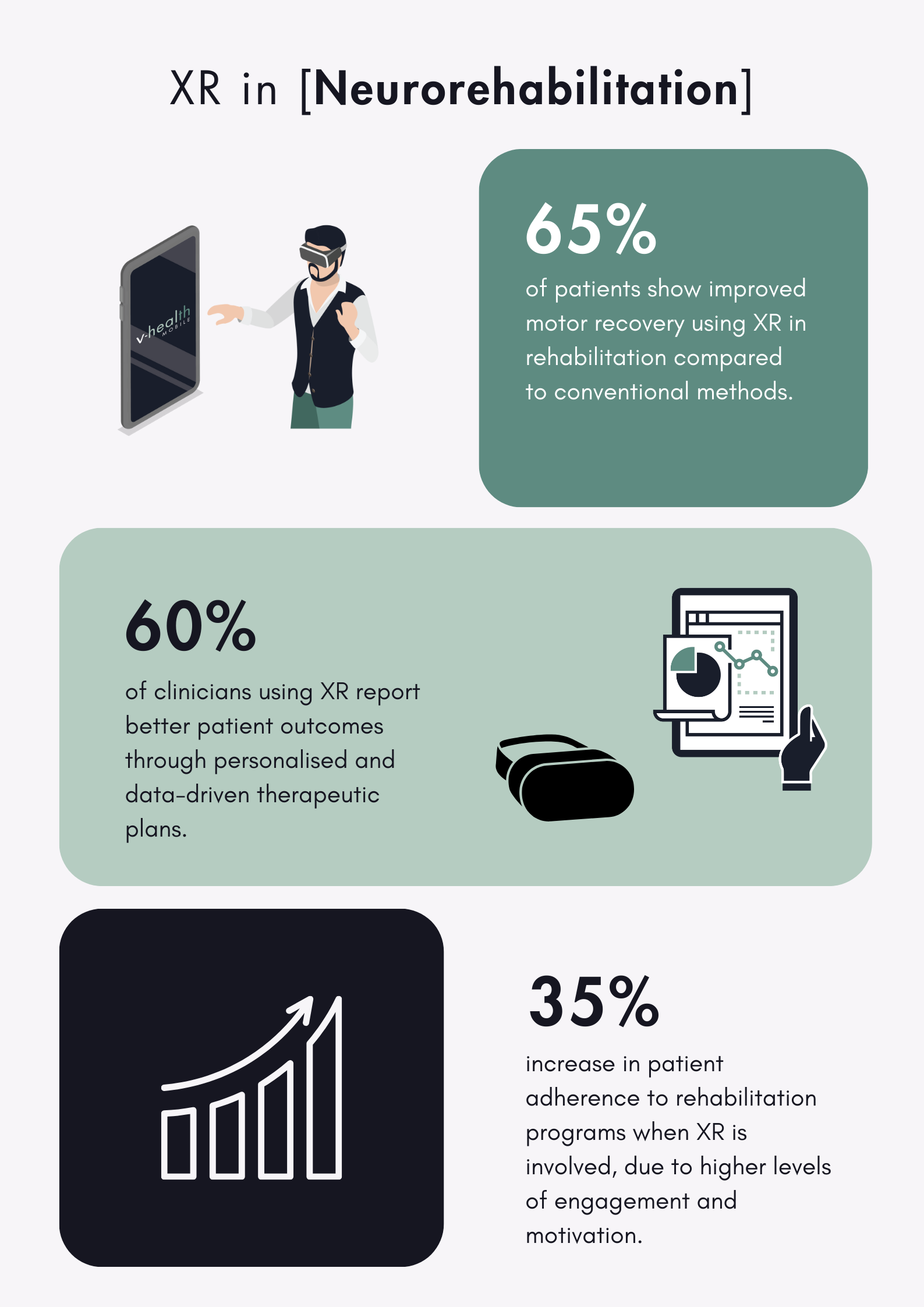The Role of XR Technologies in Neurorehabilitation: Effective, Engaging, and Accessible Care
October 17, 2024
Neurorehabilitation is essential for treating conditions such as stroke, traumatic brain injuries, and neurological disorders like Parkinson’s disease and multiple sclerosis. Traditionally, recovery has involved physical therapy and occupational therapy. However, XR (Extended Reality) technologies transform neurorehabilitation by providing immersive, data-driven, and remote rehabilitation experiences. With XR, clinicians can deliver personalised care while patients benefit from greater accessibility, engagement, and motivation, improving long-term outcomes.
Source: Neurorehabilitation with Virtual and Augmented Reality Tools, 2023
Sun, Y., Hunt, C.L., Lamounier, E.A., Soares, A.B. (2023). Neurorehabilitation with Virtual and Augmented Reality Tools. In: Thakor, N.V. (eds) Handbook of Neuroengineering.
Benefits of XR in Neurorehabilitation
XR technologies offer a significant shift in neurorehabilitation by enabling personalised, engaging, and repetitive task practice, all essential for motor recovery. Let’s explore how XR benefits both patients and clinicians:
Enhanced Patient Engagement
XR tools like VR create interactive environments where patients perform exercises within virtual scenarios. This level of engagement increases motivation and engagement. Studies show that patients are more likely to adhere to treatment plans when they enjoy the process.
Improved Motor Recovery
Repetition is key for improving neuroplasticity—the brain’s ability to adapt and form new neural pathways after an injury. VR-based rehabilitation promotes repetitive, task-oriented exercises that are essential for stroke survivors and those with neurological disorders, showing enhanced motor recovery compared to traditional therapies.
Accessibility and Convenience
XR platforms can be accessed from any location, reducing barriers such as travel or hospital visits. This is particularly beneficial for patients with mobility restrictions, ensuring continuity in therapy and improving recovery prospects.
Data-Driven Insights
XR systems allow clinicians to track real-time data on patient progress, offering a clear view of movement patterns and improvements. This enables healthcare providers to tailor therapies to the individual, adjusting challenges as needed for optimal recovery.
Remote Monitoring
Clinicians can monitor patient performance remotely, making XR highly beneficial for home-based care. Real-time feedback provides valuable insights into a patient’s adherence and progress.
Customised Therapy
XR tools help clinicians personalise treatment by adapting therapies to each patient’s needs and progress. This ensures patients receive the right exercises at the right time, accelerating recovery while reducing the clinician's workload.
XR technologies are reshaping neurorehabilitation by providing patients and clinicians with innovative tools for more effective, engaging, and accessible care. From enhancing patient motivation to offering personalised treatment and remote monitoring, XR is not just an add-on but a central part of the future of healthcare. With its proven benefits, XR is set to revolutionise recovery for neurological conditions, bridging the gap between traditional therapy and cutting-edge innovation.
For us at Valkyrie
At Valkyrie, we are deeply committed to advancing neurorehabilitation through XR technologies. By integrating our expertise in virtual reality, functional electrical stimulation, and motion haptics, we strive to enhance long-term patient outcomes, making rehabilitation more accessible, engaging, and personalised. Our solutions empower clinicians to provide targeted, data-driven treatments while giving patients the tools to increase their therapy time.



